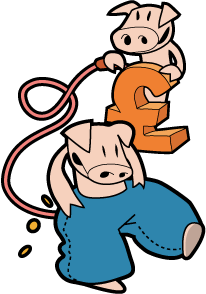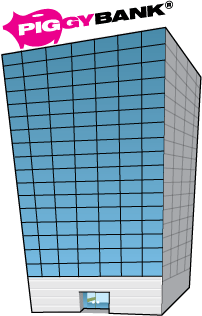 The Trickle Down FactorThe City of London is the centre of the financial world. It’s a place where wizards and magic makers of old would feel very much at home. In fact, one of the country’s greatest corporate investors is called Alchemy! The Price of Pocket MoneyYour parents decide they want to give you about £40 a month pocket money, which is roughly the national average for pocket money. Nice. They’ve worked out their financial budget consisting of how much money is earned, any tax due on those earnings and what the monthly household and other daily family expenses are going to be.  A group of homeowners in Middle America can’t pay their mortgage. An oil pipeline in MidWest USA breaks. Fresh attacks in Iraq. Russia decides to increase the price of gas to Ukraine. The Ukraine threatens to increase the price of pumping Russian gas from Russia to Europe. China and India consume more steel than any other countries on the planet. The problems in America trigger a loss of confidence in some of the US banks which have sold their loans to British banks who suddenly realise they don’t have an asset (something a company owns) worth any money. This is repeated around the world, again and again. Panic.  The Interest in BorrowingCredit - money we borrow now to pay back later - which was easy to get, is all of sudden difficult to come by and very expensive. The banks increase their interest charges and reduce the amounts they are willing to lend. Paying it all Back!Financiers who were able to pick up a phone and call the banks to lend them millions of pounds a day to buy and sell property and shares on favourable credit arrangements, are being asked to settle their debts quicker. They have to start selling their assets, sometimes for less than they expected, just in order to pay down the debts.  The Politics of MoneyThen, it gets worse. Political problems, foreign unrest, wars, natural disasters, accidents on oil pipelines, Russia playing power politics. Result: a general unease; a loss of confidence. Fewer banks are willing to lend money to people to buy properties. There are, therefore, more properties for sale than there are buyers willing or able to buy. Consequently, and for the first time in a long while, the price of property goes down. This means that the value dad thought he had in the house you live in, called equity, is less. How Did That Happen?Result? There is less money to spend and - perhaps - one of the casualties of this might be the weekly pocket money being reduced from £40 to, maybe, £30. GlossaryMortgages:Money borrowed from a bank or a building society in order to purchase property - a house, for instance. Under the Mortgage Agreement, the borrower agrees to make a series of payments back to the Lender. The money lent by the bank is secured against the value of the property, which means if the payments are not made by the Borrower, the Lender can take back the property. Credit Agreement:An agreement to repay a credit loan. Financier:A group of people, companies or banking institutions that club together for a common purpose. They usually do this because when the amount they have to invest is so large, it’s better to divide it up - and spread the risk! Assets:Things you own which have financial value, like a house or a car. Interest:Interest is the money banks will pay you for keeping your money. It is also what the banks will charge you for lending you money. Generally, interest is expressed as a percentage over a period of time, like 5% per annum. In this case, the borrower will pay 5% of the amount of money borrowed each year, on top of the total amount borrowed. Bank interest is higher to borrow than to deposit. |
| Home | City Talk | The Biz of Showbiz | Go to my FSE | About | Contact |
|

|
| © 2006-2012 Piggybank Multimedia Limited, Under Licence. All Rights Reserved. Terms & Conditions | Website custom developed by Netfactors, London |











